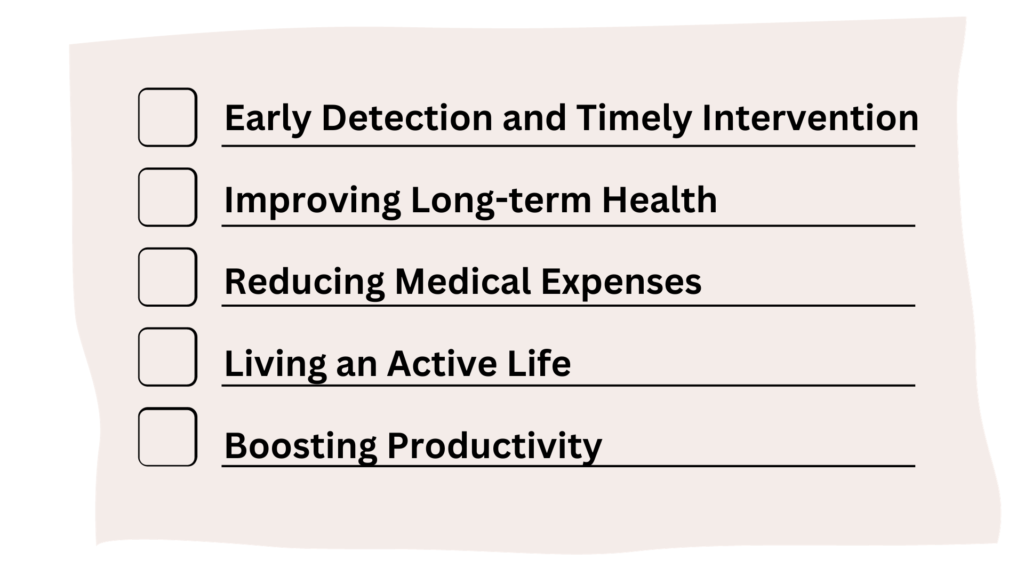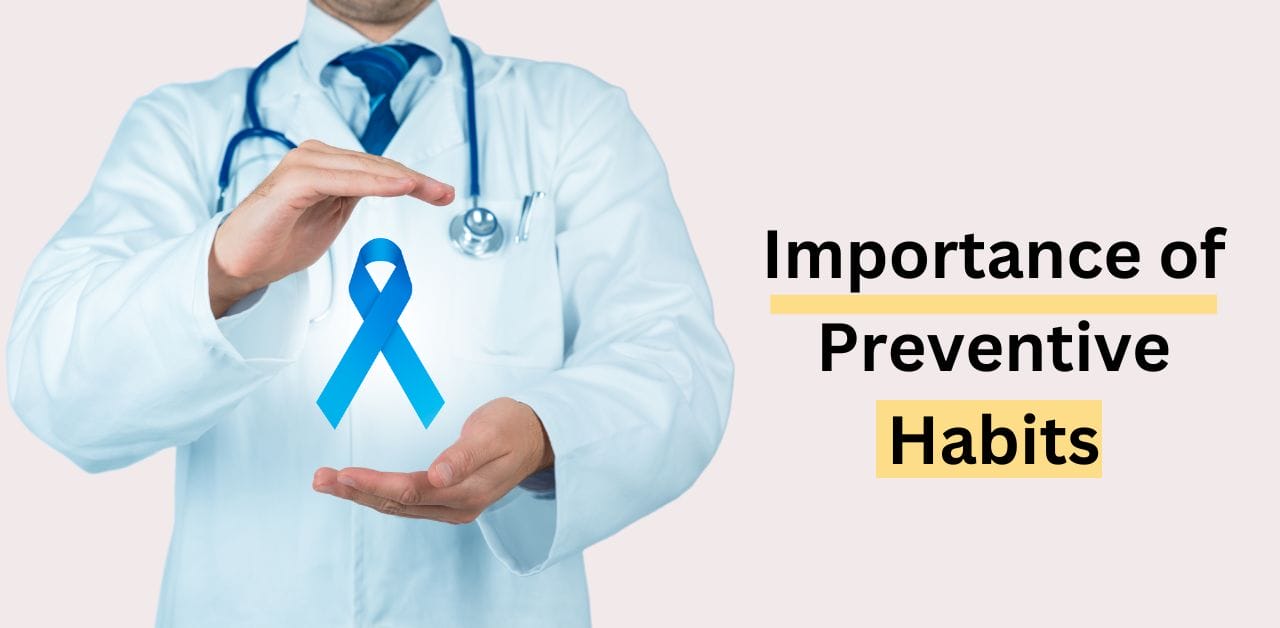“Prevention is better than cure” is an old saying, and it holds a significant reality when it comes to health care. Understanding the importance of preventive habits is essential because it is a proactive approach to addressing health issues.
It is crucial for maintaining overall well-being, detecting potential health issues early, and ensuring long-term vitality. Have you thought about preventive healthcare while feeling healthy? Even in good health, prioritizing preventive care is vital to staying healthy in the long run.
This blog will explore why preventive habits are important and how they save lives and medical expenses.
Table of Contents
What are Preventive Habits?
Preventive habits encompass a spectrum of proactive actions and lifestyle choices aimed at avoiding potential health issues before they arise.
These habits involve,
- Embracing a balanced diet
- Regular exercise and ample sleep.
- Stress management and stopping bad habits like smoking, nail biting, excessive blinking habit and excessive alcohol consumption.
Understanding Preventive Care
To understand why preventive habits are important? It is essential to learn what preventive care is.
Most of us consider health care as a treatment of an existing illness. But imagine if, instead of treating disease when it occurs, we could prevent it from occurring in the first place. This is where preventive health care comes into action.
Preventive care refers to healthcare precautionary measures taken to prevent illnesses or detect them at their nascent stages.
It encompasses routine check-ups, screenings, immunizations, and lifestyle modifications to maintain overall health and prevent disease onset.
When the risk factors or signs of a disease or health issue are not detected early, patient care becomes more reactive than proactive, resulting in two serious problems.
- First, medical problems are often only treated once they become more serious. It is not suitable for the patient.
- The second is that, generally, patients and healthcare providers must pay more to treat serious health concerns.
These two problems have elevated the importance of preventive healthcare to the top of the field.
Why Preventive Habits Are Important
Due to the importance of precautionary health care, it is crucial to build preventive habits. The five major significance of developing these habits are as follows.

1. Early Detection and Timely Intervention
One of the primary importance of preventive care is its ability to detect health issues early. Regular screenings and check-ups enable healthcare professionals to identify potential concerns before they become serious problems. This timely intervention significantly enhances the effectiveness of treatments, leading to better health outcomes.
For instance,
- Early detection of high blood pressure (hypertension) through regular check-ups allows timely intervention. Managing high blood pressure through lifestyle changes and proper medical care reduces risks of heart disease, stroke, and kidney damage.
This proactive approach leads to better health outcomes and lowers long-term health complication risks.
2. Improving Long-term Health
Adopting preventive habits and undergoing regular check-ups will significantly enhance your chances of maintaining good health over the long term. The more proactive you are, the more prepared you will be. Health preventive measures can help you with long-term health benefits,
- Lower blood pressure
- Prevent diseases like cancer, diabetes, and mental illness.
- Longer life expectancy
- Healthier skin, bone, and teeth
This proactive approach can prevent the development of chronic conditions, ensuring a better quality of life.
3. Reducing Medical Expenses
It is said that “An ounce of prevention is worth a pound of cure.”
Preventive health care expenses can lead to substantial savings in medical expenses over time. Detecting and addressing health issues often reduces the need for expensive treatments that might arise if conditions are left undiagnosed or untreated.
According to studies, every dollar spent on preventative services saves several dollars in future healthcare expenses.
- A study published in the National Institute of Health in 2010 discovered that if 90 percent of preventive care treatments had been employed in 2006, $3.7 billion or 0.2 percent of the US personal healthcare spending may have been saved.
4. Living an Active Life
Who doesn’t want to live a longer, healthier life? Preventive care extends your lifespan by keeping your body in optimal condition. It empowers individuals to live more actively and fully. It is more than just medical interventions.
Exercise is a cornerstone of preventive care. It aids in weight maintenance, cardiovascular system strengthening, and mental health improvement. Every week, aim for 150 minutes of moderate aerobic activity or 75 minutes of strenuous activity.
It also includes encouraging important healthy living habits and lifestyle choices. By maintaining health through preventive habits, individuals are better equipped to engage in daily activities, pursue hobbies, and enjoy a higher quality of life.
5. Boost Productivity
Preventive healthcare contributes significantly to enhanced productivity by prioritizing wellness and averting potential health issues before they become serious concerns. When individuals actively engage in preventive health practices, they maintain better overall health. This leads to
- Reduced sick days
- Improved physical and mental well-being
- Increased focus and heightened energy levels.
Preventive habits like regular exercise and balanced nutrition help maintain high energy levels throughout the day. When you have more energy, you can work more efficiently and accomplish more tasks without feeling drained.
It also enhances your cognitive function, means better problem-solving abilities, quicker decision-making, and improved memory, all of which contribute to higher productivity.
By investing in preventive care, individuals can avoid prolonged illnesses or health complications, allowing them to stay consistently productive in their personal lives and workplaces.
Healthy employees tend to be more engaged, motivated, and efficient, contributing positively to organizational productivity.
Types of Preventive Care
Some important types of preventive care are the following.
1. Vaccines, Screenings, and Tests
Vaccines, regular screenings, and health tests are fundamental to preventive health care.
Vaccines are designed to enable people to avoid infectious diseases by boosting their immune system’s ability to identify and combat particular microorganisms. Examples,
- Flu shot
- vaccines against measles, mumps, polio and COVID-19
These are a few examples of preventative health care offered in the US.
Routine screenings and health tests involve procedures like blood tests, mammograms, or screenings for conditions like high blood pressure or diabetes.
These measures help detect diseases or health issues early, enabling timely intervention and treatment, thus preventing complications or progression to more severe stages.
2. Public Health and Education
Public health initiatives and educational campaigns are crucial components of preventive care. These aim to raise awareness of routine check-ups, disease prevention, and good lifestyle choices.
3. Genetic Breakthroughs and Applications
Advances in genetics and their practical applications contribute significantly to preventive health care. Genetic testing helps individuals understand their susceptibility to inherited conditions, enabling proactive measures to minimize risks.
Examples of Preventive Care
The United States Preventive Services Task Force (USPSTF) issued a list of 102 evidence-based recommendations for preventive care measures. Here are the most common and impactful preventive healthcare measures.
These practices or health preventative measures depend on age and the particular risk factors of individuals in their medical history.
1. Adult preventive care
I. Blood Pressure
Blood pressure screening is one of the most significant approaches for identifying risk factors for severe diseases in adults.
- High blood pressure screening can help prevent strokes, heart failure, and coronary heart disease events.
- Low blood pressure screenings can reduce cerebrovascular events, heart failure, and mortality.
Screening for diabetes and cholesterol is also a primary health preventive measure. One report published in 2019 by the National Institute of Health shows that “One in two (50.1%) people living with diabetes do not know that they have diabetes”.
Detecting pre-diabetes can help the patient receive simple and dietary treatment.
Cholesterol screening can reduce the risk of cardiovascular disease, which leads to heart attacks and strokes. Early detection of high cholesterol can help in prevention by medication or physical exercise.
II. Immunization
Most people think of vaccine as something kid needs, but it is equally for adults. COVID-19, flu shots, etc., are recommended vaccines for adults.
III. Cancer screening
The most common cancer screenings are mammograms and colonoscopies. Early detection of the cancer by these screening can make cancer diagnosable and stops becoming more serious.
IV. Counseling
It serves as preventative care by offering you early intervention by identifying and addressing potential mental health concerns before they escalate. Counseling sessions often include psych education; this knowledge empowers individuals to recognize
- Warning signs
- Seek help proactively
- Adopt health preventive measures in their daily lives.
2. Child Preventative care
Preventive health care might assist children in staying healthy when they are young and as they get older.
It involves a range of proactive health measures to prevent illnesses, promote healthy development, and address potential health concerns early on.
Preventive care offered to children includes:
I. Well-child visits
When your child is a baby, these visits happen every few months; after that, they happen once a year. Well-child visits include measurements of your child’s growth and developmental phases.
II. Immunizations and Vaccinations
Administering recommended vaccines according to the schedule set by healthcare providers helps protect children from various infectious diseases. Vaccinations prevent the spread of illnesses and contribute to community immunity.
Conclusion
In conclusion, building preventive habits is important because they form the cornerstone of a healthy society. Embracing these habits isn’t just about staying healthy; it’s a proactive approach toward a fulfilling life. The significance of early detection, regular screenings, and a health-conscious lifestyle cannot be overstated. By prioritizing preventive care and embracing the philosophy “prevention is better than cure,” individuals safeguard their health and empower themselves to lead vibrant, active lives, ensuring a brighter and healthier future.
FAQs
What are some common preventive habits everyone should adopt?
Some essential preventive habits include:
I. Eating a nutritious and balanced diet.
II. Engaging in regular physical activity.
III. Practicing good hygiene, such as washing hands frequently.
IV. Avoiding harmful behaviors like smoking and excessive alcohol consumption.
V. Getting regular health screenings and vaccinations.
Are preventive habits only important for adults?
No, preventive habits are important for people of all ages. Starting early can:
I. Establish a foundation for a lifetime of good health.
II. Prevent the development of unhealthy behaviors in children and adolescents.
III. Reduce the risk of diseases and conditions that can manifest later in life.




